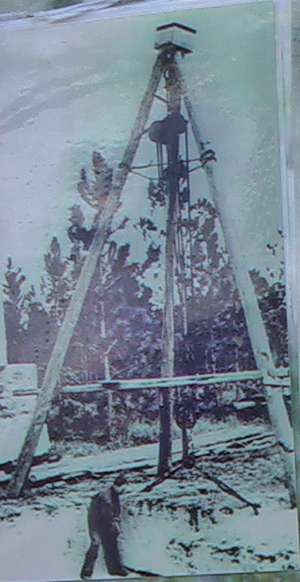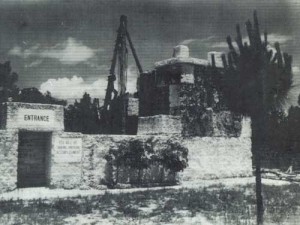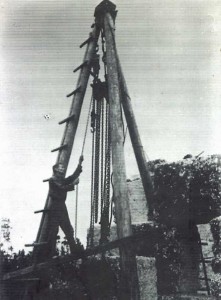Coral Castle Busted -- Interesting but not Anti-Gravity
How could one man, 5 feet tall and barely 100 pounds, excavate, shape, and hoist hundreds of massive coral blocks, the largest weighing 28 tons, into a structure by himself? This mystery has intrigued people for decades, drawing visitors from all over the world. But the truth is much less intriguing, though still impressive.
by
Sterling D. Allan
Pure Energy Systems News
On the way home from my "Scouting
for Free Energy Technologies in Europe" trip, I stopped in Ft.
Lauderdale, Florida, to check out a couple of technologies.
One is a thermal electric technology and was the primary reason for my
stop in Florida. But unfortunately, the inventor, Carlos Avila Rivera,
was busy with investors and couldn't break away. He promised to come to
Salt Lake later to demonstrate it to me there.
So as a good second option, I hoped to stop by
Blue World Crete, which turns
municipal solid waste into building materials, while also eliminating
their toxicity. But a conflict of interest was discovered at the last
minute, and we had to cancel that visit.
While in town, my hosts, Fred and Zuri Hart, took me to
Coral Castle
in Miami.
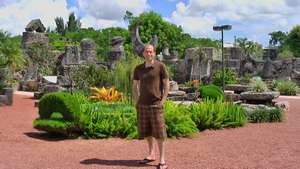
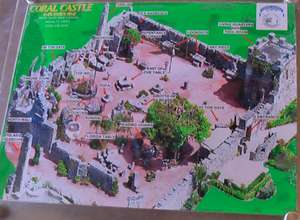
 The mystique has been strong around this structure built by Ed
Leedskalnin, who was love struck by a gal who didn't reciprocate his
affection, so he built a monument to her, using huge pieces of Coral,
the largest weighing 28 tons.
The mystique has been strong around this structure built by Ed
Leedskalnin, who was love struck by a gal who didn't reciprocate his
affection, so he built a monument to her, using huge pieces of Coral,
the largest weighing 28 tons.
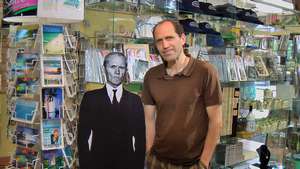 And he supposedly built it by himself -- at night, so no one could
discover how he did it -- a feat that is phenomenal for anyone. That he
was only 5 feet tall and weighed a mere 100 pounds, increases the
mystique. Allegedly, no one knows how he accomplished this; and this
mystery is increased by his statement to the effect, "I think I have
figured out how they built the pyramids." There is even a legend about
some witnesses to his having levitated the stones.
And he supposedly built it by himself -- at night, so no one could
discover how he did it -- a feat that is phenomenal for anyone. That he
was only 5 feet tall and weighed a mere 100 pounds, increases the
mystique. Allegedly, no one knows how he accomplished this; and this
mystery is increased by his statement to the effect, "I think I have
figured out how they built the pyramids." There is even a legend about
some witnesses to his having levitated the stones.
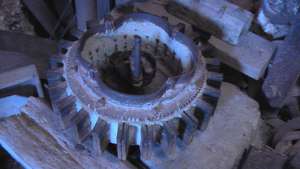 Also on the premises is an odd looking device that some speculate could
have been an all-magnet motor, possibly involved in the levitation work.
Also on the premises is an odd looking device that some speculate could
have been an all-magnet motor, possibly involved in the levitation work.
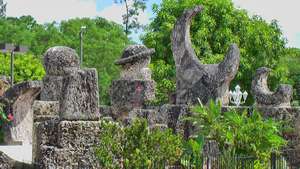 A plethora of Masonic symbolism, and Ed's involvement with the Masons,
expands the imagination further into the possibility that some kind of
forgotten occult practices were used as well.
A plethora of Masonic symbolism, and Ed's involvement with the Masons,
expands the imagination further into the possibility that some kind of
forgotten occult practices were used as well.
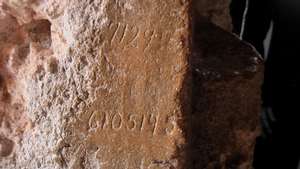 An inscription on the second floor door is thought to have been some
kind of hint he left for people to be able to figure out how he
accomplished the seemingly impossible.
An inscription on the second floor door is thought to have been some
kind of hint he left for people to be able to figure out how he
accomplished the seemingly impossible.
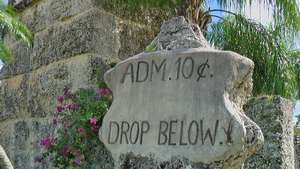 It turns out that every one of these mysteries has a very boring answer,
and the reason Ed milked the mystique was that it brought business in
the form of curious visitors, who each plunked down ten cents (worth a
lot more back then) for the privilege. He was probably even more
motivated by the awe that people exhibited as they marveled at how any
man could do what he did.
It turns out that every one of these mysteries has a very boring answer,
and the reason Ed milked the mystique was that it brought business in
the form of curious visitors, who each plunked down ten cents (worth a
lot more back then) for the privilege. He was probably even more
motivated by the awe that people exhibited as they marveled at how any
man could do what he did.
How do I know this?
First, near the end of our tour, our guide,
James T. Miller, mentioned a few things that got us curious, so we
got to asking around, and in doing a follow-up interview with James to
post to YouTube,
as well as some additional probing, we got a lot of great information.
James said he has post-graduate degrees and has been a lawyer for 33
years and a historian and college professor. He does all of his own
research. "What I say at the Coral Castle is not a script. I have
complete freedom to say whatever I want."
One guide kept prefacing what he said with, "I'm not supposed to be
saying this," and "don't tell anyone I told you this."
The Coral Castle museum would loose its draw if people knew what we were
being told. Not good for business, especially if the business is based
on myth.
What magician tells his audience how he does his tricks?
The problem is that people don't consider Coral Castle as a magic show.
They often consider it a display from someone who figured out how to get
around the forces of gravity.
If Ed truly had mastered levitation, then why did it take him 20 years
to build the structure?
What is the truth about Coral Castle?
First, let me tell you a little about our tour guide and his
qualifications.
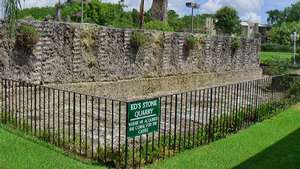 Note the wedge marks along the edges of the stone. |
He has lived in the area all his life, and became intrigued by the
castle as a child. He has also worked with the extraction of large
stone, so he has physical experience with the processes. He's also
talked to several local people who were witnesses to the building of the
structure, and he has done research about the structure and its legends.
|
|
In the tour, he showed us photos of Ed hoisting the stones via a
block and tackle apparatus, with heavy chains and three posts in a
tripod. "Give me a lever long enough and I could move the world," is a
famous quote by Archimedes. Do a Google image search on Ed Leedskalnin
and block and tackle. This method was pioneered in Latvia where Ed
emigrated from.
James has talked to people who remember seeing Ed using the block and
tackle. And they remember him building during the day some times.
As for horizontal movement, James referred to a website:
http://www.theforgottentechnology.com/ It features a carpenter by
the name of W.T. Wallington from Flint, Michigan, who has demonstrated
the ability to move very heavy objects horizontally by himself using
simple methods.
With modern equipment, it's hard for us to fathom such feats, but before
that equipment was available, clever people came up with ways to use
leverage and pivots to move large objects.
The primary reason Ed built at night at first was that it is very hot
during the day. I'm guessing that later on, as the mystique grew, he
fostered that mystique the best he could.
As for the legend that people saw Ed levitating stones, a local
policeman shed light on that one. He said that Ed had problems with kids
breaking in at night, to spy on him. When the policeman showed up to
question some kids one night, they didn't want to get in trouble, so
with theatrical faces, they said something to the effect that they had
seen Ed levitating the stones. The officer, who knew how Ed moved the
stones, rolled his eyes, and shoed them away.
As for the writing on the door posts on the second floor, that was
actually a common practice for immigrants in the area at the time. In
order to secure their immigration number, they would write it on the
door post. The numbers on Ed's stone post are consistent with that.
The magnet motor contraption was nothing more than a very crude electric
generator with copper coils (now absent) that powered two small lights,
nothing more. It only worked as long as the generator was turning, which
probably didn't happen very often because of its weight.
James pointed out the markings on the rock where Ed had used metal slats
to pound into the rock to split it from the base. You chip away the
vertical sides, then excavate a place large enough next to the stone to
pound the iron slats in. James pointed to the iron slats on display and
noted their pointed edge on one side and hammered edge on the opposite
side. James himself has used that method. It is standard practice when
you don't have explosives.
And the shaping of the rocks was done by a chain with a cutting edge on
it. This is also standard practice.
As for the large pivoting door that you could turn with just one finger
(both Jim and Fred remember doing that years ago, before the bearings
gave out), which made people marvel at how Ed might have balanced that
so well, James knows someone who did a 1-ton replica to illustrate the
process. You find the center of gravity and drive in a post, remove
stone from either side until it is balanced, and then you place the side
posts so that they fit.
Learning all this, the biggest question is why someone would do this,
other than to make a point that it could be done. He certainly was not
introducing advanced technology that some day someone would unfold to
bring gravity modification to the masses.
So, when Ed said he thought he'd figured out how the pyramids were made,
he was apparently referring to tripods, block and tackle, fulcrum
leverage, etc -- all largely forgotten technology to us today.
I must mention that, to their credit, one of the fliers that the museum
gave us upon entrance does talk about block and tackle, but they make it
sound like the fame of the facility is despite that. I would argue that
the fame is largely due to people thinking something more exotic than
that was used. I can tell you that I would not have bothered to show up
if I knew beforehand that block and tackle were used.
www.pureenergysystems.com
PES Network, Inc.
Copyright © 2003 - 2012
